#necromancer kael'thas
Text
And you may never see Faltheriel again for that matter

Meanwhile, we're still in the Dalaran Daily Mail LIVE! studio with spooky Faltheriel of all people...
Faltheriel: ...Now I'm sure you can imagine why Ner'zhul insisted that Kel'thuzad be resurrected using an old, recycled urn and an existing, if ancient, power source. It was less costly to just have Arthas do that using his father's urn, his undead army and the Sunwell, than dare go through a bunch of greedy necromantic debt collectors.
Trixany: ... I'm a Blood Elf.
Faltheriel: *sips tea*
Trixany: And you're also a Blood Elf.
Faltheriel: True.
Trixany: At least I hope you are. We were talking about spring nail polish colors, what I thought would be a safe topic for you Faltheriel, you weirdo--when suddenly you got onto this tangent about undeath and phylacteries...
Faltheriel: I'm just. Very passionate about this topic. Young necromancers, warlocks, cultists, or any spellcasters at all getting taken advantage of. We are fragile, we are not like other people.
Trixany: You just tried to paint Arthas Menethil as some sort of maverick hero, beating the necromancer student loan debt system--which for some reason according to you, hinges on naive necromancers renting out phylacteries like timeshares--by re-contextualizing Arthas' horrid desecration of the Sunwell. You just warped Warcraft III around your own sick headcanon which is probably centered around a weird personal trauma I do NOT want to know about, Faltheriel!!
Faltheriel: Back when I was in the Burning Legion, I walked in on Kil'jaeden making Kael'thas play strip poker.
Trixany: You nut. Arthas destroyed our homeland!!
Faltheriel: Look. Arthas is already beloved by so many fans of the Warcraft universe--we may as well give them another reason. Right, everybody? Yeah! Let's hear that applause!!
Audience: *conflicted silence, one loose cheer*
Faltheriel: *stands up* I am no longer secretly ashamed of my time in the Burning Legion and how it fractured my psyche. The tea... must be spilled. *dramatically tips over his teacup*
Trixany: Hey, watch it! My set! Faltheriel, you can't just--
Faltheriel: It is done! Those of you who can stomach the topic of somewhat innocent Blood Elf mages being scammed by their evil superiors, follow me! The rest of you--
Producer, over the speaker: Ah, sorry Miss Cuomo. We can't watch you do this. *studio lights shut off* Show's been canceled.
Trixany: *drags a hand down her face* It's like the culling of Stratholme all over again.
0 notes
Text
shallow grave
Archmage Kael’thas Sunstrider comes back home to a kingdom in ruin, a city in flames, and a father whose body has not yet finished cooling on the cold dry earth. The sky is choked with smoke and ashes; the streets run red with blood. His people need him — his people need better than him — and if he’s all that they have, then he’ll have to be enough.
He allows himself a day and a night to grieve, to bury his father and water his grave with his tears. Then, in the hours before dawn breaks on that second day, while his people do the same — while they bury their dead and mourn all that they’ve lost — Kael’thas lays down his grief and goes to the Sunwell.
The font of magic, like its city, like its people, was broken and tainted at the hand of the Scourge. The air echoes with a sound like the distant howling wind, but it sits heavy and still around him. Once it rang like a struck chord with the arcane energy swirling within.
This, nearly more than the bodies still lying in the streets, tells Kael’thas that they are dying.
His people need magic to thrive. They need magic to survive. Arthas has cleaved through the city to reach the heart of their power, but it’s no surprise that he wouldn’t bother to destroy them the way he has destroyed Lordaeron. What is left of them, without the Sunwell? What more does he need to do than sit and wait for them to succumb to the hunger that Kael’thas can already feel clawing at his heart?
Their survival isn’t a given anymore. It’s a question.
And what remains of the Sunwell offers an answer.
-
It is alive, Kael’thas finds, though he’s always expected that much. It is alive enough to be in pain, as its body is the sin’dorei’s body and their suffering is its suffering. Soon, it will die, and there will be nothing left to soothe the pain of their people.
But in these last moments, the Sunwell does not look for a way to ease its own anguish. It doesn’t fear its own end; for really what end can there be, for the mindless soul of a people, that shall live as long as they live and die alongside them? But it fears that they might never be avenged. They have been baptized anew in blood; now it would have them drown their enemies in it.
Magic, like its practitioners, holds grudges. It is a language of debt, spoken only through what you draw from it and what it takes from you. And there’s nothing quite so daunting as a debt never paid back in full.
Kael’thas hears this — the rage, wordless and unending, of a being that only exists as an instrument to a people’s collective will. Something in him answers.
This anger that finds its echo inside of Kael’thas is a pyre, he thinks, and it shall consume him if he lets it.
(His name means phoenix, in their language. He can no more fear the flames than the Sunwell can fear death. It is not in his nature.)
-
Prince Kael’thas Sunstrider walks into the throneroom changed, though the people gathered would be hard-pressed to say how. Perhaps it is in his eyes, the barely noticeable flicker in their golden light.
The Sunwell is gone. Long live the Sun Prince.
Still, no one speaks of it. They may not know what has transpired, but there is an instinctual recognition of the Sunwell buried deep in them. Like a compass points true to the north, they recognize this magic without knowing it.
He can feel it as well, like another heart within himself. The pulse, alien as it is, chills and comforts him in equal measure. He is both more and less than what he was before stepping into the Sunwell. Maybe he isn’t even the same person at all; something different, rather than exalted or diminished by the change.
“We will march in a week’s time,” he tells the new Ranger-General, Lor’themar Theron.
The man looks weary. The mantle is heavy on his shoulders, for all that he wears it well. Already he looks Kael’thas in the eyes when he speaks, and refuses to flinch at what he sees there.
“With what army, my lord? Over half our forces are dead; those who still live are exhausted, or stationed too far from the city to reach us before we depart.”
“You worry about the living, Lor’themar, and I will worry about the dead.”
The Sunwell was tainted by the Scourge when it sunk into Kael’thas; he can feel that as well. But Kael’thas is not a Well of magic that feeds an entire kingdom.
He is but a man, and a man may be touched by necromancy and survive in a way a Well cannot.
A man can be a necromancer.
And Kael’thas intends to be one. He intends to be the best necromancer there ever was, actually, because when has he ever settled for anything less?
-
When he walks through the streets, people hush and step aside. They see that he is grieving, and the world knows what happens when the Sunstriders grieve.
Dath’Remar founded a kingdom over this grief — for a time past, for magic that he could not bear to be parted from. Kael’thas has lost so much more; his retribution will match the scale of his grief.
He walks until the ground underneath his feet has gone black with ashes and graveyard dirt; until the stench of rot chokes him; until he can walk no more for all the bodies still not buried, and the few still walking that threaten to take notice of him. They could tear through him in seconds, alone as he is, still strong from their master’s passage.
That’s fine. He won’t be alone for long.
He knows his people by the shape of the space left empty by their absence. The awareness is unnatural — no, not unnatural. It’s foreign to him; not meant for a body like his own. Not meant to be embodied at all. It’s like an itch under his skin, a calling that he can’t quite hear.
When he reaches for it, something reaches back.
It feels rather like fire, where he would have expected ice. It stands to reason that his magic would not suffer the cold, no matter how necromantic the source. If anyone were to raise the dead with the very fire that would see them cremated, likely as not it would be him.
The flames race across the ground, seeking their brethren: the fires that used to burn in the heart of dead sin’dorei. Once found, the embers are rekindled by the deadfire; light blazes in empty eyes, and what few bodies were left behind by Arthas rise to their feet. Fire can be seen through the gaps in flesh, beneath exposed ribs, like a coal engine fueling the precious machine of their reanimated body.
The ghouls shy away from them, hissing at the light they cast. The burning dead pays them no mind, if they have any mind left to pay; they gather themselves into neat ranks to be inspected.
Kael’thas expected it to take more energy, but even the shattered remains of the Sunwell are more magic than any one man should hold; he doesn’t even feel winded. He steps up to one of the risen bodies. A civilian, he thinks; most of them must be, to have been discarded by Arthas. She looks up at him and he sees nothing in her eyes but a reflection of his own resolve.
These he will walk out of the city, to be buried with dignity. They didn’t live a life of battle, and he finds himself reluctant to give them such a restless death. Without the instinctual knowledge of weapons carrying over from their life, he’s not even sure he could make them fight.
But after— he’ll have to find motivated graverobbers, he thinks, and appeal to the noble houses of Silvermoon for authorizations to desecrate family crypts. There are many soldiers buried in the city, and he intends to make use of them all.
-
Again bodies walk through the streets of Silvermoon, though this time the prince that leads them trails embers in his wake rather than frost. It’s a testament to their grief that few bother to curse him for it; once he’s laid the bodies outside of the city, away from the ghouls that would devour them before they can be buried, his people come to him with questions on their lips but little blame.
Though it might be because they are too shocked for outrage to take root.
“How?” Lor’themar asks, helpless, as they watch the last of the dead lay down at the end of a row of their kind and go back to their eternal sleep.
“It is my duty to keep this kingdom safe,” he replies, which is not much of an answer at all. “And, this failing, to see it avenged.”
It doesn’t feel wrong, that playing with the natural order of things, though he expects Arthas had a remarkably similar train of thought before laying waste to the city of his birth. It feels as natural as all other magic Kael’thas has ever wielded. It will take care to keep it from getting out of hand; this is the kind of power that corrupts absolutely.
Unlike Arthas, this magic does not come from a place of corruption; it is born of the sin’dorei and for them, and draws its power from the seven thousand years of memories and magic that made up the Sunwell. As long as he holds on to that impulse of protection rather than destruction, he thinks he can make it.
Maybe that’s why it doesn’t feel any different than other spells. Because it fits him, that burning desire to keep what belongs to him safe, to the point that he’d bend the laws of nature to do it. Maybe it wasn’t so much a transformation as an evolution; a rebirth into something not so much changed as made better suited to its task.
“You’re different,” Rommath notes nonetheless, though it doesn’t sound accusing.
In the absence of the Convocation of Silvermoon, Kael’thas brought his demand for bodies directly to the noble houses. Most have agreed, animated by the same desire to see their enemies brought down, never to hurt them again, no matter the cost. He’s making rounds through their cemeteries now, watching every undertaker in the city and any abled person willing to take up a shovel digging up caskets and carrying shrouded bodies to the outskirts of Silvermoon where their troops are gathering. They’ll have to be quick. Work with corpses requires speed as hygiene can hardly be guaranteed.
It’s lucky that they’ve somewhat lost the tradition to cremate their dead. Many still do; and they are safe from his sacrilege now, though all sin’dorei soldiers are sworn to protect the kingdom any way they might, in life and beyond. Commoners have been coming to offer their own dead to his cause. He would not ask that of his subjects; but they understand the need for desperate measures.
What good is a full grave to the living?
“Am I really?” He asks idly, crossing names off his list. The Brightwalker crypt has been emptied already; their matriarch watches over the process herself, red-eyed but strong in the face of her youngest son’s body being brought out and covered by a veil for transport. “Besides the obvious.”
Rommath tilts his head, considering this. “Not by much, I suppose.”
“Is it a good difference?”
“That, only time will tell. But it’s a necessary one; that much I believe.”
Of course Rommath would understand. They are, in the end, creatures of pride, and pride begets duty. Good has nothing to do with it.
-
They march out of Silvermoon with a force diminished from the invasion of Quel’thalas — but still thousands strong, and twice what they might have been able to gather if not for Kael’thas’ foray into graverobbing. Grave-borrowing? He’s regent, now, would be king if he had bothered to get crowned. He has a right to conscript a few bodies, he thinks, if he promises to give them back after.
Arthas leaves a clear trail to follow, and they do. The dead can march forever, if need be; the living are not so impervious to fatigue, but desperation pushes them forward nearly as efficiently as Kael’thas’ magical control would.
He rides at the front, half a mind on the control of the army of undead at his back and the other half on the army of undead they’re marching towards.
They plan to cut Arthas’ path in Northrend; they meet the Forsaken on their way north, which is a surprise for both parties.
An arrow nearly takes Kael’thas’ head clean off his shoulders. It combusts in flight and disintegrates to ashes before reaching him, caught by a mage more attentive than he is. The next volley meets the same fate, and is quickly followed by the soldiers shifting formation — Lor’themar’s cry of protect the prince answered by hundreds of clanking armor.
Looking up, Kael’thas sees them coming from the trees like wraiths; dark figures, alight with death magic, but walking with a confidence that the shambling masses that Arthas controls simply lack. He holds his counter-attack, for now, though their approach makes his entire body shake with a kind of aimless bloodthirst. The Sunwell remembers what has hurt it; it does not forget hate nor fear easily.
When it becomes clear that the undead will neither attack nor come forward, Kael’thas rides out of the protective circle of his men, heedless of Lor’themar’s complaints. He recognizes Sylvanas soon enough. She’s a difficult woman to forget, even looking for all the world like she’s just clawed out of her grave.
“Ranger-General Windrunner,” he greets, as pleasantly as he can muster. He’s had a hard time sounding pleasant, lately. “I’m afraid I’ve given away your job.”
Her glare is a fierce thing, and her hand flexes around her bow like she’s considering striking him down anyway. “Prince Kael’thas. You’re alive.”
“No need to sound so disappointed.”
Ignoring him, she casts a look at the troops at his back. He can imagine what she sees: the strange glow of the reanimated soldiers, standing shoulder-to-shoulder with the living in an uneasy, desperate show of force.
“Your soldiers are not.”
“Indeed they aren’t.”
Her sharp eyes come back to him, assessing. “Have you gone and pledged yourself to the Scourge, then, since you could not beat it?”
Her tone suggests he would not leave this place alive, if that were the case. But her assumption is only met with a flash of rage; Kael’thas’ grip over his reins goes white-knuckled, and he has to breathe shallowly through his nose before he speaks again.
“I would have Arthas dead by my hand, if I can; the Sunwell concurred, and gave me the means to achieve this goal.”
It is a remarkably reserved way to summarize events. Yet Sylvanas looks as if he had struck her, eyes widening as she takes in the force behind him once again, quickly.
“Ana’band tur, anu dor’ishura belore.” You speak, and we should hear the sun. Once a ritual phrase meant to show respect to the king or queen of Quel’thalas; now a literal truth.
He tilts his head to the side in acknowledgement. “So it is.”
As expected from the fierce ranger, she takes that information with suspicion rather than relief. She squares her shoulders and asks, walking the fine line between curiosity and suspicion, “What makes you different from the Scourge?”
“I do not claim to resurrect anyone.” At her disbelief, he gestures at the army at his back. The corpses are still in a way the Scourge, ever shifting like one giant creature of hunger, could never manage. “They are all animated, by magic and the lingering will of their soul to protect their land — puppets rather than slaves, I suppose.”
When one lives hundreds of years, their soul leaves an imprint on the body that is hardly scrubbed by death. Even when only skeletons remain of the people they once were, the bones remember what it was to love Quel’thalas — and to die for it. They are ready to do it again, if they must.
Sylvanas observes him silently. Gauging him, though what she hopes or expects to find here he doesn’t know.
“Will you join us?” he asks, once it becomes clear she will not speak again.
“We have taken Lordaeron for our own — as free, independent people. I cannot fight your war, prince.”
Death changes them all, no matter which side of it they are on. If she considers herself more undead than she is elven, then so be it.
“Then will you fight with us?”
Sylvanas Windrunner has never turned down a fight. Especially not against the Scourge.
-
Northrend is a cold, barren place, but Kael’thas’ army burns bright as if it is carrying its own sunlight, stowed away in the gaps between their bones. It keeps them warm when the howling blizzard would tear the flesh right off their skeleton.
It is only a worry for those of them who still have flesh to lose, which is a majority by not quite as much of a comfortable margin as they may like.
Kael’thas makes them march on until they can’t take another step, and then a few miles more, until the snow and the storm-grey sky have become one uninterrupted expense of darkness and they have no choice but to put up tents and fires. His men suffer through because they, too, can feel the end coming. They are running out of time. Soon fate will decide whether Arthas lives or dies, and Kael’thas intends to wrestle the decision from its hands.
The dead among their ranks light the way in the dark, they keep frostbite and hypothermia away, they keep their kin safe. That is what they were made for.
The fire set to an arrow and the fire of the hearth come from the same ember.
And through it all Kael’thas keeps a tight hold over the magic that animates them. It grows in him, like a fire kept well-stoked by rage, rekindled whenever it falters by the sight of yet another body puppeteered by Arthas.
Every forward party, every cohort of undead they cross paths with, they dispatch with immense prejudice. And once the dead have been killed again, they sort through the wreckage and pull the sin’dorei from their hard-won rest.
Fight for me, Kael’thas whispers, breathing fire into the furnace of their chest. Fight for your people, so that they may one day rest as you do.
There is nothing left of the person they once were in these restless dead — sometimes very little of their body even — but that small kernel of devotion to their kin, that banked ember that he coaxes back into a blaze.
Their numbers keep growing as they pick the Scourge apart, little by little. It makes them easier to spot; good. Let Arthas come track them down. Let him face the people he sought to destroy, and be destroyed in return.
-
Someone else takes notice of them — this glowing army of half dead men that burns through Northrend on its way to the Frozen Throne.
The demon hunter descends upon them, armed and unafraid, as if he might fight them all single-handedly if given the chance. But he keeps his hands at his side as he asks which master they serve, with a kind of foolish hope that they may not fight him.
“We serve the crown of Quel’thalas,” Lor’themar says, bright and sure in his role of Ranger-General, shielding Kael’thas behind his greater bulk. “Who are you? Who do you serve? Who do you fight?”
Illidan Stormrage serves no one, he claims, but himself; but he fights the Scourge, and the man at its head who would summon Archimonde to their world, and little matters more in an alliance than shared hatred for the Scourge nowadays.
Kael’thas steps past Lor’themar, crosses the barren space between his army and the lonely figure of the Betrayer, stands toe-to-toe with him and asks, “Will you fight with us?”
And Illidan — anger burning in face instead of eyes, a grief too large for even he to carry — a man who has only ever had himself to fight for, and to fight with—
This man looks back at Kael’thas’ smaller form, at the burning army of the dead that follows him, at the suffering of a people hounding his steps. He looks at the dark resolve in his golden eyes and the stubborn set of his shoulders as he prepares to fight — he’s always prepared to fight — and sees himself, younger and fairer but just as hungry. Just as desperate.
Victory or death, he whispers, quiet around a mouthful of teeth and blood, taking Kael’thas’ hand.
Sometimes both, Kael’thas replies, only half in jest, and shakes it.
-
These are three armies alike in desperation, taken to the limit of their force, unified in singular hatred of the force marching to the Frozen Throne.
It’s their edge, in a cruel way. No one could expect them to reach Arthas in time to cut him off; no one but themselves, pushing themselves to cross the continent in half the time it ought to take, the dead carrying the living when their mortal bodies fail.
They’re sharp, the three of them, all too clever for their own good, each ruthless in their own way. Each foolish in the same way. Sylvanas would have their men die to reach the battle one day sooner; Illidan would die himself for a chance at slowing Arthas down; Kael’thas would burn this continent to the ground and fall with it, if it meant ridding the world of its curse for good.
They balance each other out, somewhat, or rather keep each other contained by virtue of their sharp edges, like brawlers stuck in a fighting ring made up of the drawn blades of the audience. Stray too far from the plan, and you bleed. It’s as simple as that.
As a long-term alliance, calling it flimsy would be an abject overestimation. But here, in Northrend, with their time quickly running out, it’s as solid as steel to Kael’thas.
“You are fascinating,” Illidan says, watching the way golden light plays across Kael’thas’ skin as he weaves the spell over his troops stronger, makes sure they keep moving, keep burning, and never run out of fuel. The Sunwell is not an endless source; but it will hold until the end. That much he knows.
“I don’t think I am,” he replies easily, though that’s a lie. He knows himself to be one of a kind; but he’s been raised properly, and it’s impolite to brag.
Illidan doesn’t buy it for one second. “You are,” he insists, holding a strand of Kael’thas’ hair between two claws. It emits a faint glow, like heated metal, that might go unnoticed if not for the color it casts over Illidan’s darker skin. Like holding sunset in his palm. “All the power of a well of magic, held within one man— It’s not so much a surprise you can raise the dead, when one thinks about all the other things you might do with such magic at your disposal.”
Slowly, so Illidan might clue in before he makes a remark of it, Kael’thas lifts his eyes up and quirks up an inquisitive eyebrow at the piece of his hair that the other man is currently manipulating. He flushes, dark against his nightshade skin, and drops it as if it burned.
Pity; Kael’thas did not mind the touch, only found it amusing that Illidan would give it so freely. But the man might not have noticed himself doing it. Out of habit, perhaps, of being more free with his affection among other demon hunters; or because he, like many of the magic-infused elves, finds himself drawn to Kael’thas for reasons he could not put into words if pressed upon it.
Pushing the offending strand of hair behind his ear, he casts a glance across their assembled troops again. His men mill about, as comfortable among the Forsaken and Illidari as among their own. Only the dead stand still, puppets without a purpose yet. He longs to put them to rest. It aches to see them denied their rightful afterlife.
“This power isn’t mine,” he says eventually. “I must give it back, though I do not know — do not wish to know — how I will go around to doing it.”
It surprises him that he’s willing to say that much, to a man so nearly a stranger as Illidan. But it is true: he is running out of time in many more ways than one, and once Arthas is dead and he has brought his brethren back to their graves, he’s afraid of what will be left for him to do.
A phoenix must die to be reborn, after all.
At least he would die for his people; there is honor in that. What would happen if he were to die here, on this frozen hellscape, bears not thinking about.
He will not, cannot, fail.
-
In the final battle — their last chance before Arthas ascends to the Frozen Throne and crowns himself Lich King — Kael’thas thinks he may die.
His blood is hot on his skin, the stench of the undead pervasive in the air, and though every one of his men that fall can still fight he’s not sure the same can be said for him. He’s nearing his limits; he’s not sure he’ll notice he has crossed it until it’s too late.
Kael’thas wants to scream as he struggles to wrestle the control of sin’dorei from Arthas’ grasp, to cut the strings that tie their spirits to this world and burn the Lich King’s mark from them until only the piece of sun inside of them remains. Give me back my people. Let my kin come home. Let me bury them properly, and never disturb their rest again.
The wind whips his hair around his face as the battle rages, and each arc from his sword draws blood, too thick with decay and frost to splatter over him. All the blood on his skin is his alone; or his kin’s, but that is very nearly the same thing.
But he’ll make it through; he has to. For his people, for his father, for all the bodies held together by magic and prayer fighting around him.
When he reaches Arthas, the world falls to a standstill.
He’d like to gloat; he’d like to rage. But words fail him. Felo’melorn in his hands, the ghost of the sin’dorei at his back, it does not matter. Actions speak louder than words.
-
Whatever his sword says for him, Arthas gives his answer in blood.
16 notes
·
View notes
Text
Chapter 6-1: Misconceptions
After his meeting with the night elves, Kael'thas returns to his base near the ruins of Dalaran.
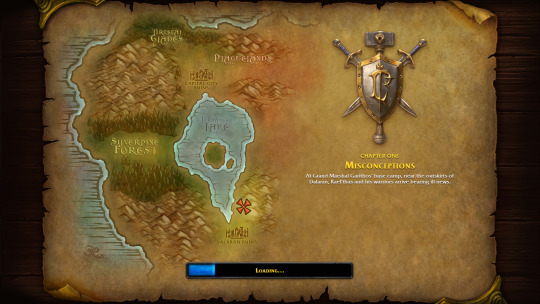
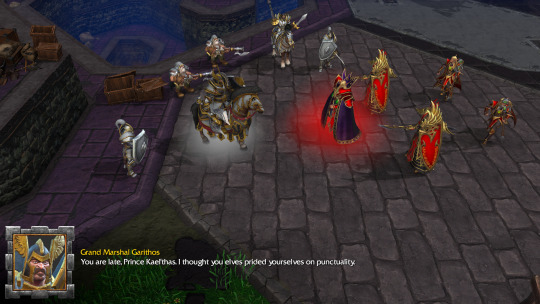
There, he meets with Grand Marshal Garithos, or as I feel obligated to call him, Garithos the Racist Bastard.
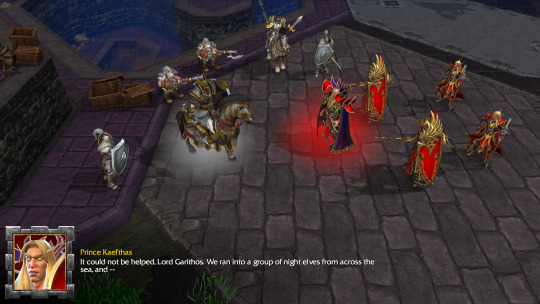
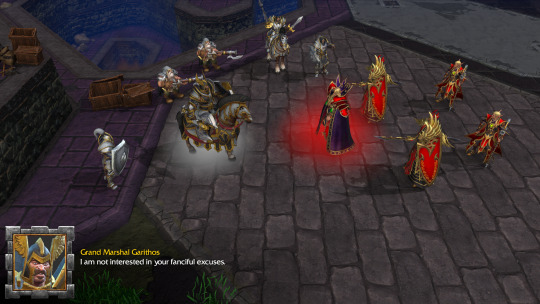
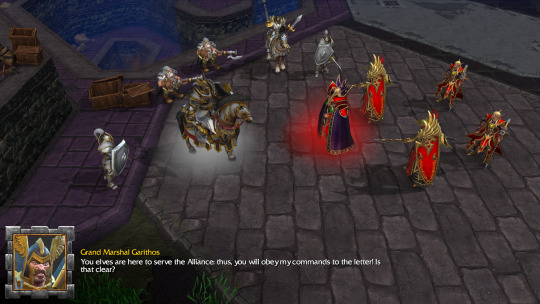
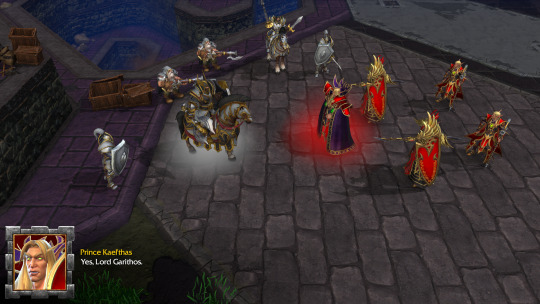
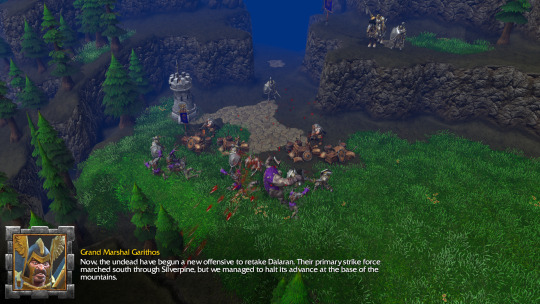
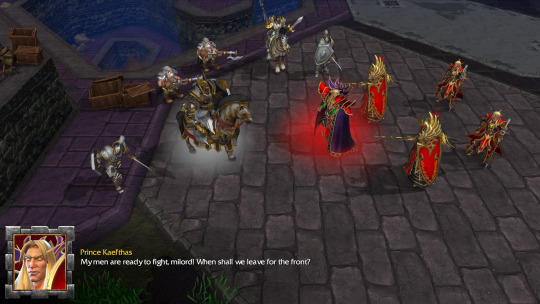
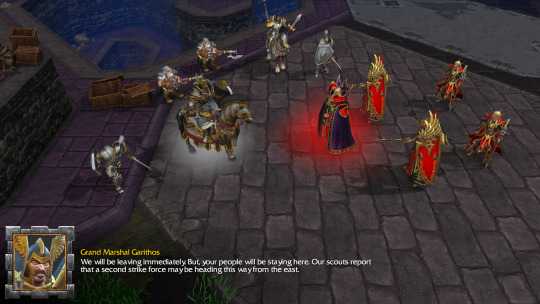
There's a little pause before Garithos says "people", which serves to confirm him as a racist bastard even more.
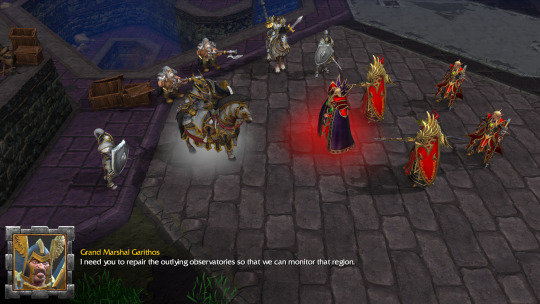
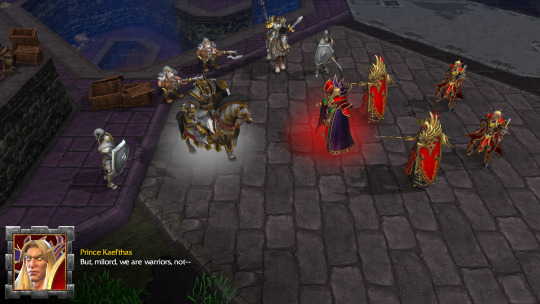
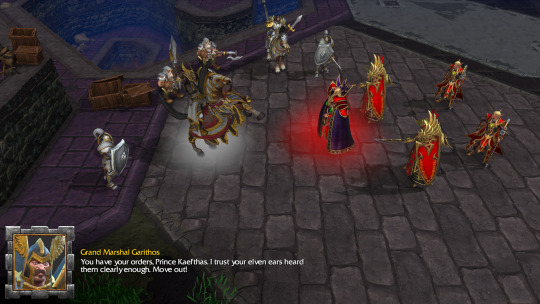
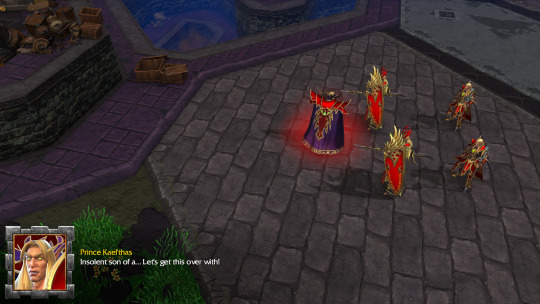
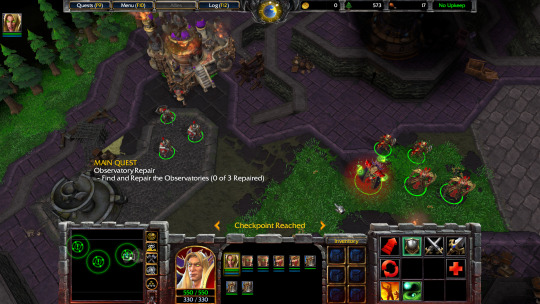
Our mission objective is to find the three Arcane Observatories and repair them to full health. The first one is right at the starting point, and we already have a Peasant working on it.
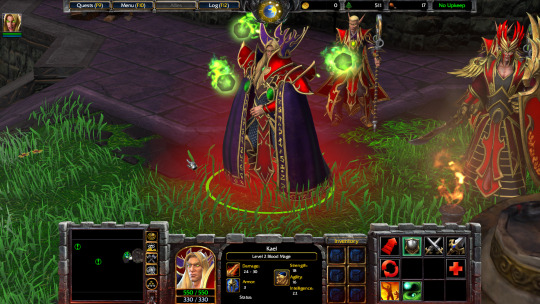
Blood Mage: Mystical hero of the Blood Elves. Fond of fire magic. Attacks using the three verdant spheres that hover around his head.
Flame Strike: Conjures a large pillar of fire that deals heavy damage over 3 seconds, then leaves behind embers that deal further damage.
Banish: Turns a unit ethereal, preventing it from attacking and slowing it down. Ethereal units can't be harmed by physical damage but take extra damage from magic.
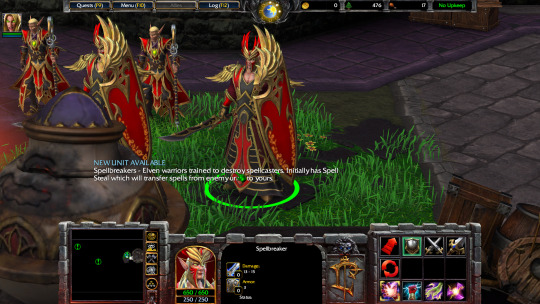
Spellbreaker: Blood Elf anti-caster specialist. Attacks by throwing spinning blades. Immune to magic, naturally.
Spell Steal: Transfers a negative effect from an allied unit to an enemy, or transfers a positive effect from an enemy to an ally. Can be autocast.
Control Magic: Takes control of a summoned unit for the rest of its remaining lifespan. The mana cost varies based on the summoned unit's hit points.
Feedback: A passive effect similar to Mana Burn. This burns mana on every attack. It's a powerful boost to the Spellbreaker's damage, but only works if the target has mana.
Spellbreakers are mainly made to counter caster units, but they can be effective against heroes too, especially intelligence-based ones.
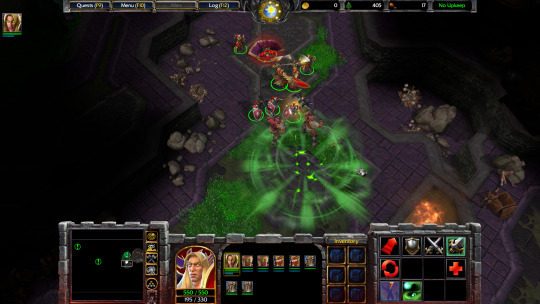
When casting Flame Strike, there's a 1 second or so delay before the pillar appears. If the caster is interrupted during this time, it won't manifest.
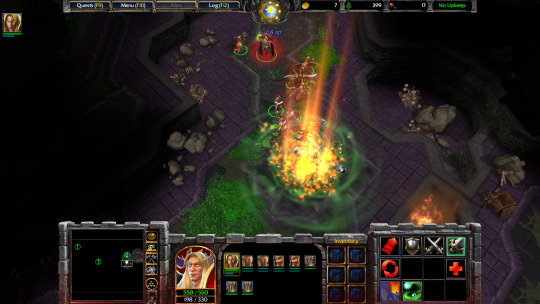
Flame Strike is one of the most visually impressive spells in the original Warcraft III, and the remake preserves it well. It's the Blood Mage's bread and butter, and we're gonna be using it a whole lot.
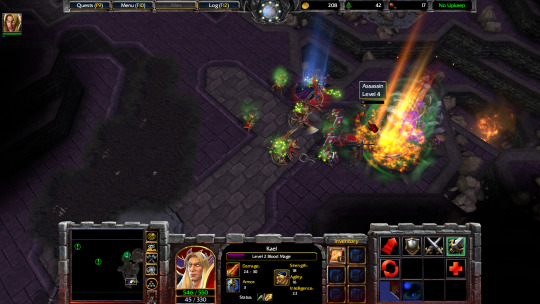
The ruined city is filled with stray demons, renegade wizards, and bandits to fight. We can also find a Fountain of Mana here, which is very handy since we have a lot of casters.
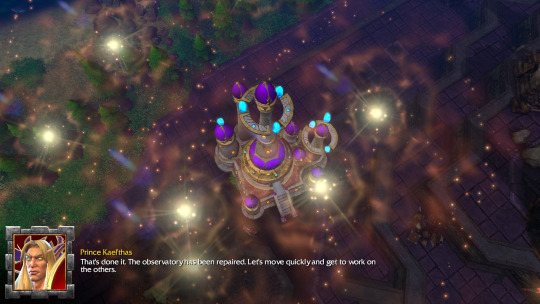
Once repairs on an observatory are finished, it reveals the map in a large radius around it.
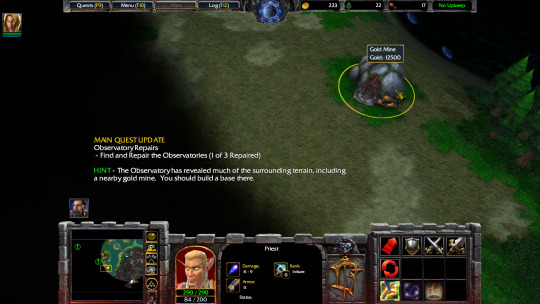
It also reveals a gold mine, and a good spot for a base.
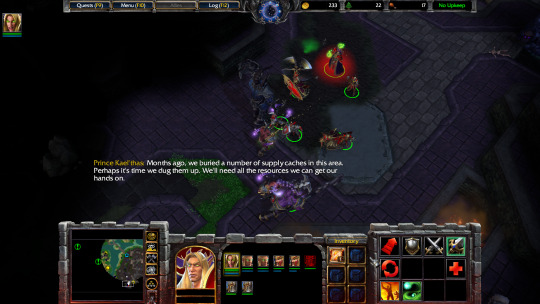
That should be very helpful, especially if we're going to work on base building.
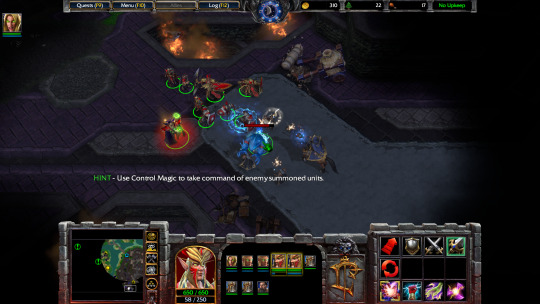
Many of the rogue wizards are good targets to test Spellbreakers' abilities on. Here we've taken control of this water elemental and turned it against its master.
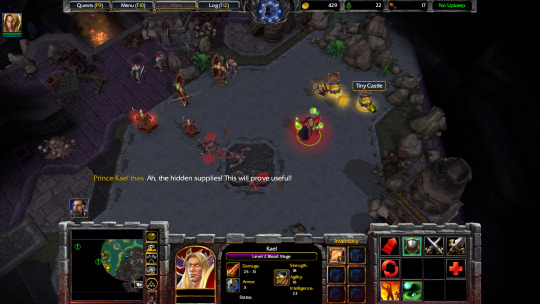
Just what we needed. This Tiny Castle can be used to place a Town Hall that will automatically build itself.
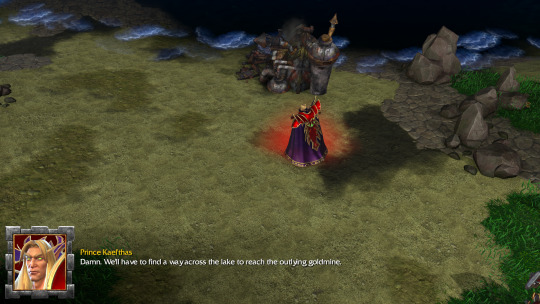
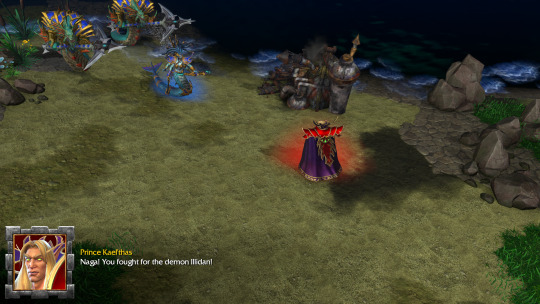
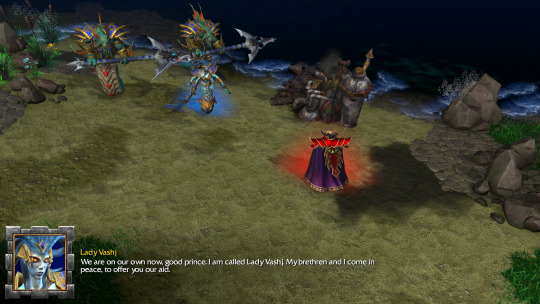
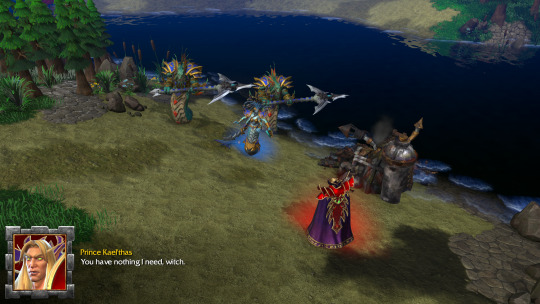
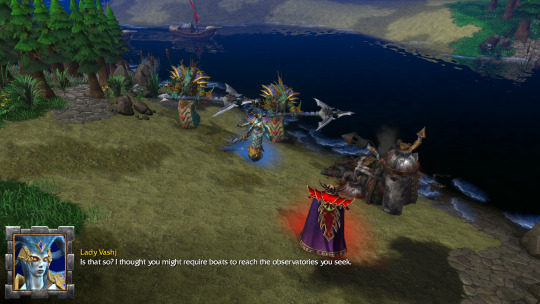
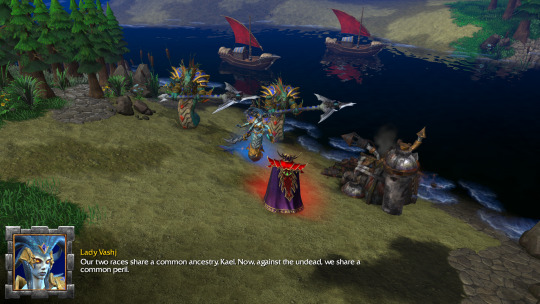
The blood elves are also descended from the Highborne of the old night elf society. After the Sundering, those who weren't blasted to bottom of the sea forsook the night and began worshiping the sun. They eventually became the high elves of Quel'thalas, and now, the blood elves.
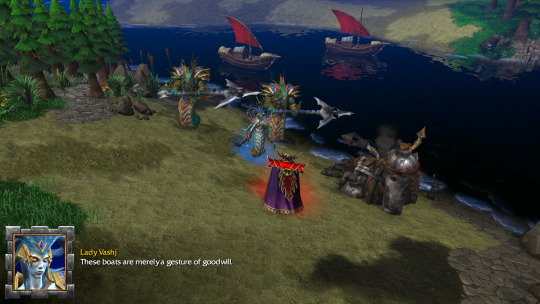
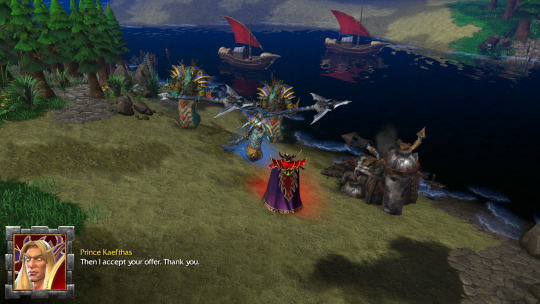
Lady Vashj grants us a pair of Human Transport Ships. These work the same way as the Night Elf version, but don't look as fancy.
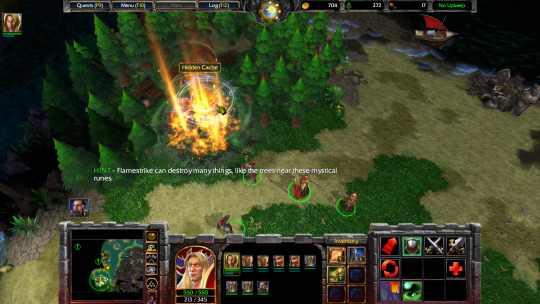
Before crossing the lake, we can blow up a few trees with Flame Strike to grab another hidden cache.
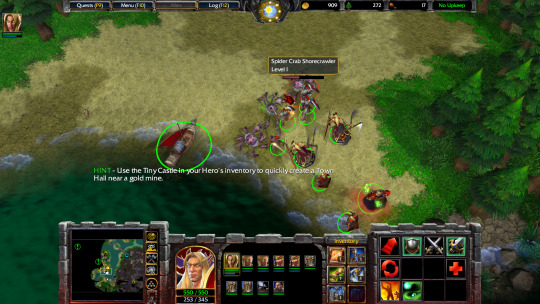
After clearing out a few crabs, we can get to work establishing that base.
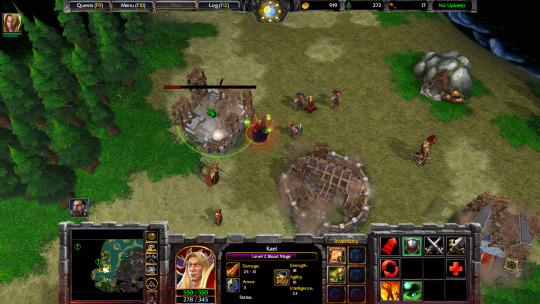
Using the Tiny Castle, Barracks, and Altar of Kings in Kael's inventory speeds things up a bit.
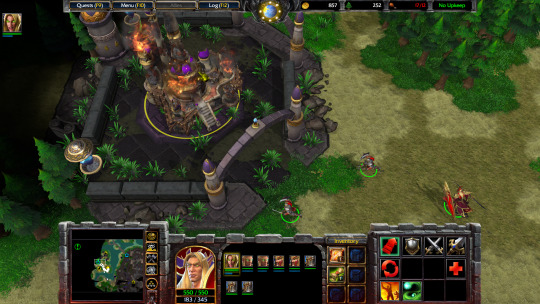
The next observatory is close by. We can get to work on it after the base is set up.
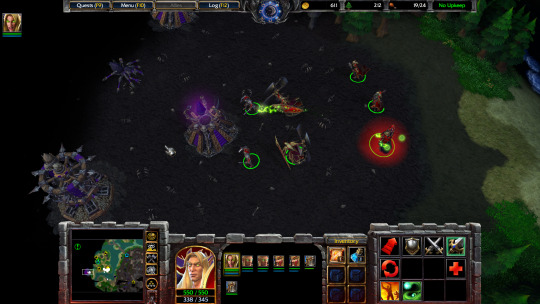
There's an undead base on the island as well. I decided to poke it a bit.
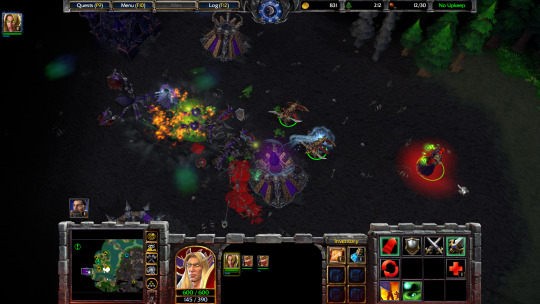
It didn't go so well. Kael and his Spellbreakers had to make an early retreat.
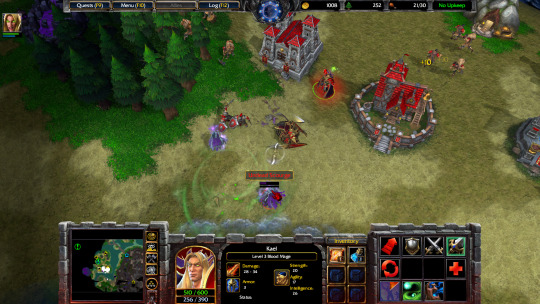
We'll be dealing with attack waves from this base coming to ours. They rely on Necromancers and Banshees a lot, making Spellbreakers very helpful.
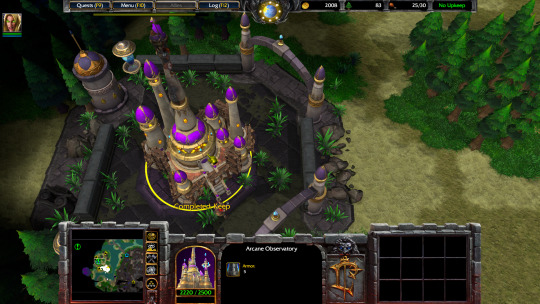
The observatories cost a whole lot of lumber to repair, but no gold. I had a whole bunch of Peasants chopping down trees to fuel this one's restoration.
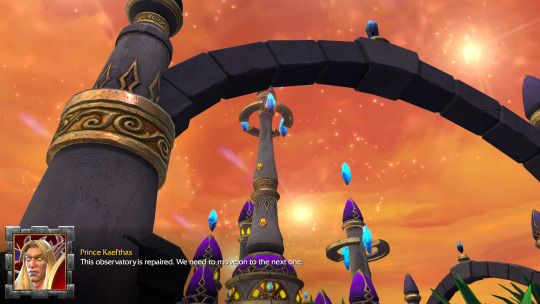
And there's two out of three.
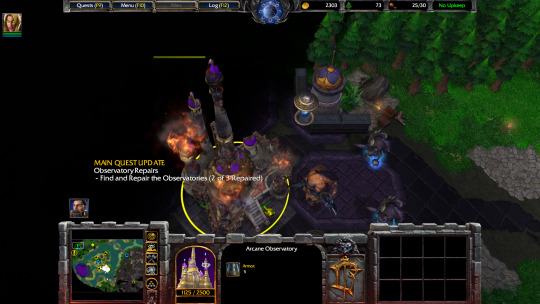
Completing the second one has revealed nearly the entire map, and shows where the third is, protected by some gnolls.
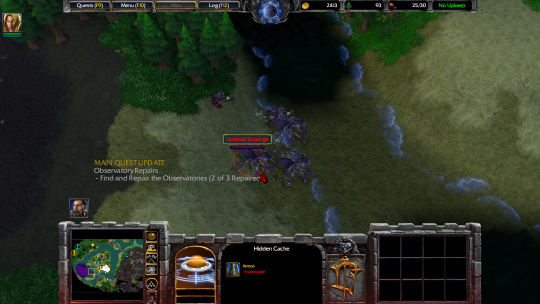
It also lets me see this incoming attack.
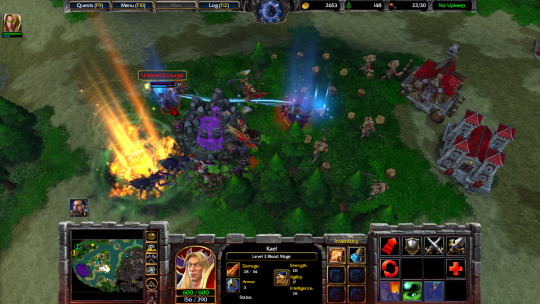
Kael leveled to 3 and learned his third ability around here.
Siphon Mana: A channeling spell that drains mana from an enemy unit. If the unit moves out of range, the effect is lost. Can be used to temporarily go above the user's maximum mana, or to give mana to an allied unit.
This is great for ensuring that we can cast even more of those Flame Strikes. We just have to make sure our Spellbreakers don't burn all their mana first.
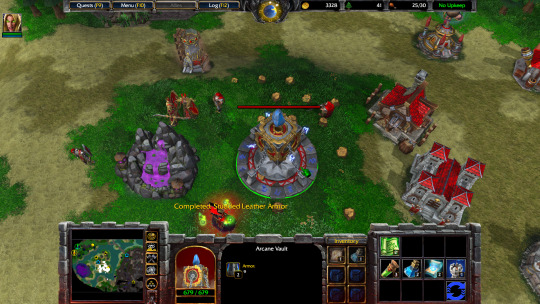
Arcane Vault: The Human shop building. The items available for sale depend on the level of your Town Hall. One unique item sold here is Ivory Towers, which can be used to build a Scout Tower.
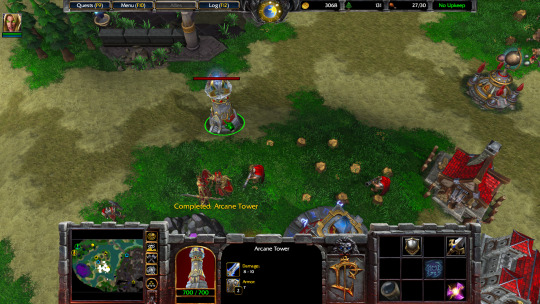
Arcane Tower: An anti-spellcaster tower upgraded from a Scout Tower. This tower's attacks have a Feedback effect similar to Spellbreakers. If the Magic Sentry upgrade is learned, it can also reveal an area of the map.
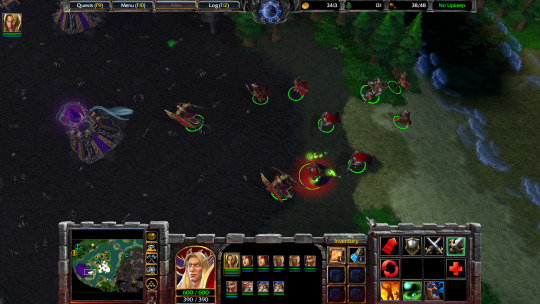
Destroying the undead base isn't required, but I felt like taking it down anyway.
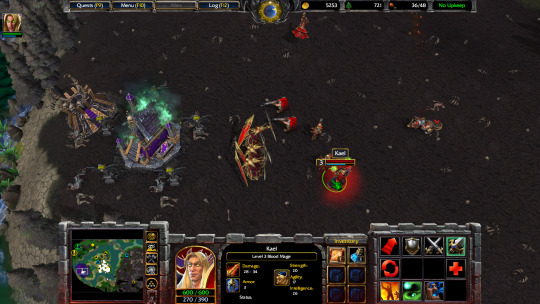
Now that that's out of the way, I don't have to worry about undead attacks on my base and can complete the rest of this mission at my leisure.
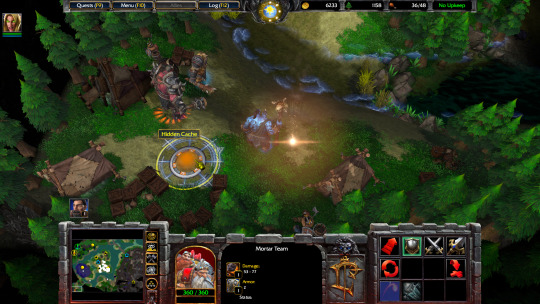
I used my Arcane Towers and Mortar Team to scout out the location of the third cache.
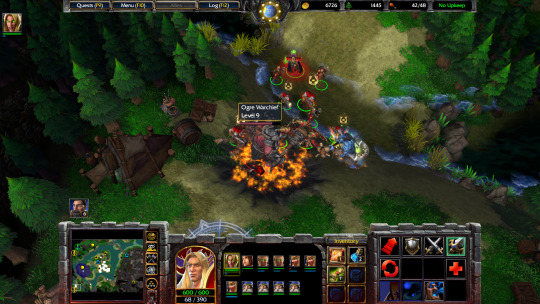
We had to fight our way through a few ogres to reach it.
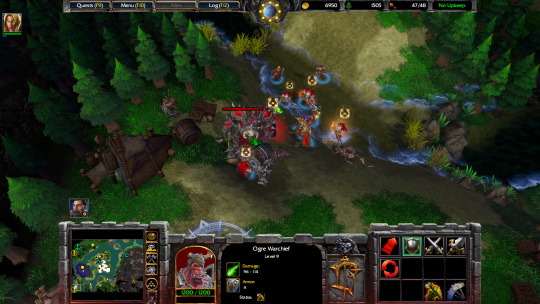
The Rune of Rebirth reincarnates the unit that dropped it on your side. Now we can make use of the ogre warchief, a heavy melee unit with Bash and Endurance Aura.
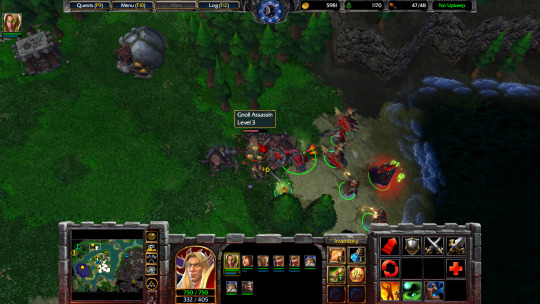
He came in quite handy for dealing with the gnolls on the opposite side of the lake.
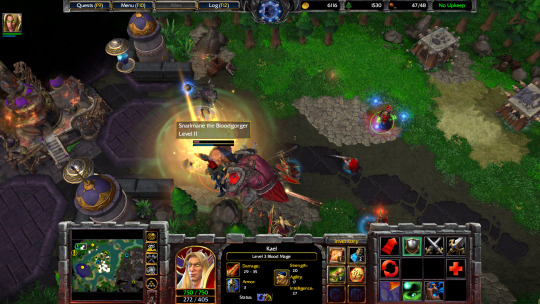
After dealing with Snarlmane the Bloodgorger, the observatory is secure.
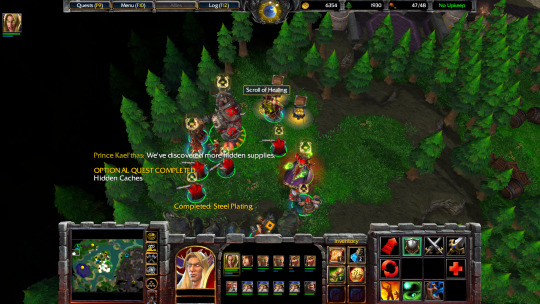
Before sending in the Peasants to repair it, I had Kael pick up the last supply cache. We don't really need this now, but Kael should be able to take these items into the next mission with him.
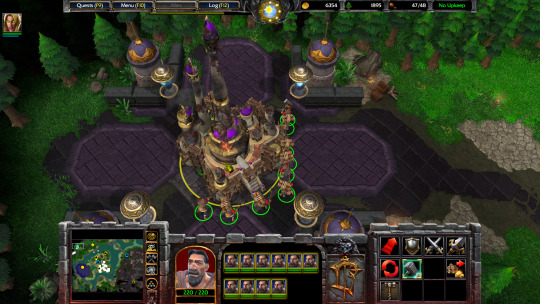
The more workers assigned to repair something, the faster it goes. Having 10 Peasants repair the observatory at once should finish it up in no time.
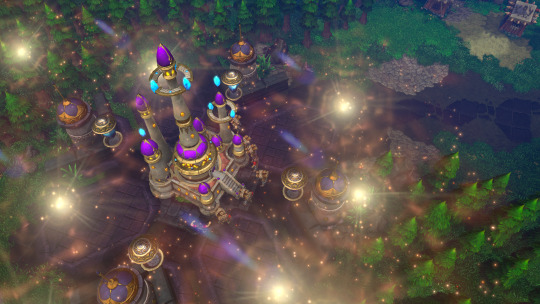
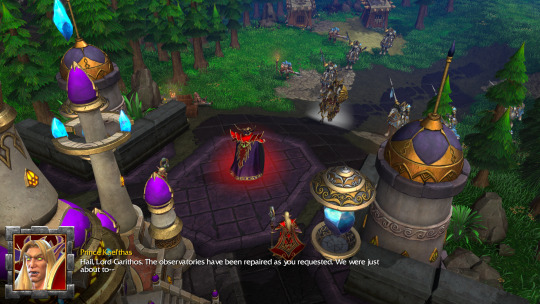
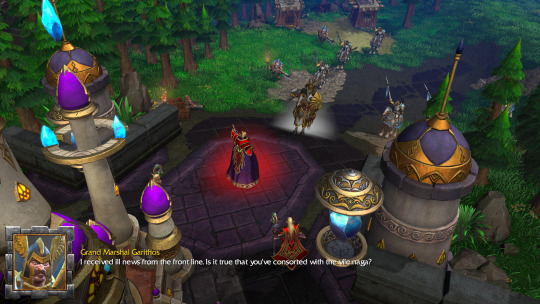
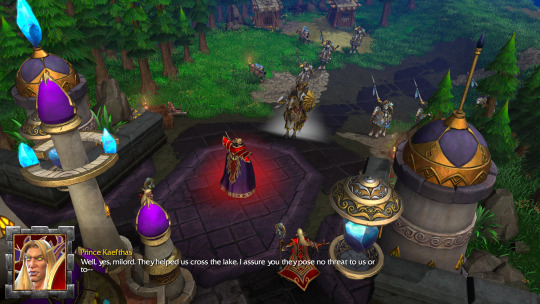
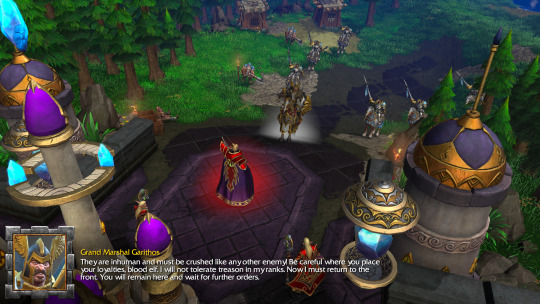
You're welcome.
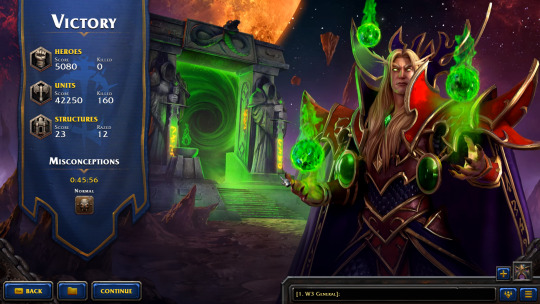
The new victory screen features Kael'thas standing in front of a dark portal (but probably not The Dark Portal). And wow, I took my sweet time on this mission.
#mezzo's screenshot lps#let's play#warcraft iii#warcraft iii reforged#the frozen throne#kael'thas sunstrider#lady vashj#grand marshal garithos
1 note
·
View note